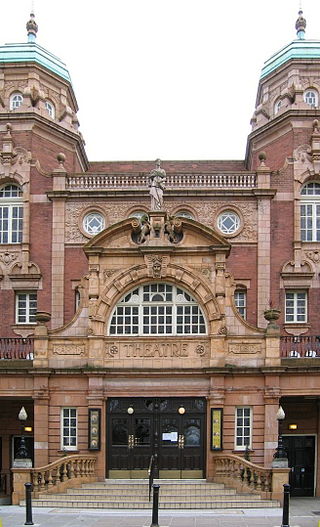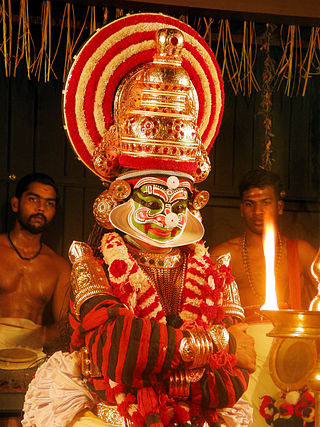The music of Barbados includes distinctive national styles of folk and popular music, including elements of Western classical and religious music. The culture of Barbados is a syncretic mix of African and British elements, and the island's music reflects this mix through song types and styles, instrumentation, dances, and aesthetic principles.

Noh is a major form of classical Japanese dance-drama that has been performed since the 14th century. It is the oldest major theater art that is still regularly performed today. Noh is often based on tales from traditional literature featuring a supernatural being transformed into a human hero who narrates the story. Noh integrates masks, costumes and various props in a dance-based performance, requiring highly trained actors and musicians. Emotions are primarily conveyed by stylized conventional gestures while the iconic masks represent specific roles such as ghosts, women, deities, and demons. Having a strong emphasis on tradition rather than innovation, Noh is highly codified and regulated by the iemoto system.

Experimental theatre, inspired largely by Wagner's concept of Gesamtkunstwerk, began in Western theatre in the late 19th century with Alfred Jarry and his Ubu plays as a rejection of both the age in particular and, in general, the dominant ways of writing and producing plays. The term has shifted over time as the mainstream theatre world has adopted many forms that were once considered radical.

The music of Saint Kitts and Nevis is known for a number of musical celebrations including Carnival. The last week in June features the St Kitts Music Festival, while the week-long Culturama on Nevis lasts from the end of July into early August.

The traditional music of Tuvalu consists of dances, including fatele, fakanau and fakaseasea. The influence of the Samoan missionaries sent to Tuvalu by the London Missionary Society from the 1860s resulted in the suppression of songs about the traditional religions or magic and many songs were lost. As the influence of the missionaries diminished in the 20th century the traditional dances were revived and the siva dance tradition from Samoa also became popular.

A tea party is a social gathering event held in the afternoon. For hundreds of years, many societies have cherished drinking tea with companions at noon. Tea parties are considered for formal business meetings, social celebrations or just as an afternoon refreshment.

There is much variation in the music of Xinjiang, including unique regional differences in Ili, Kashgar, Hotan and Aksu Prefecture. The southern area includes the simple songs of Hotan, the dance-oriented music of the Kuqa and the complexly rhythmic songs of the Kashgar. Ili has perhaps the most well-known musical tradition in Xinjiang, including a number of emotional tunes that are narrative in form.

Gombhira, Gambhira or Gamvira is a type of Bengali song and dance originating in the Bengal region, from what is known today as northwestern Bangladesh and north eastern West Bengal, India.

Shanghai Circus World is a large, permanent indoor circus in the city of Shanghai, China.

The present Richmond Theatre, in the London Borough of Richmond upon Thames, is a British Victorian theatre located on Little Green, adjacent to Richmond Green. It opened on 18 September 1899 with a performance of As You Like It. One of the finest surviving examples of the work of theatre architect Frank Matcham, the building, in red brick with buff terracotta, is listed Grade II* by Historic England. John Earl, writing in 1982, described it as "[o]f outstanding importance as the most completely preserved Matcham theatre in Greater London and one of his most satisfying interiors."

Randai is a folk theater tradition of the Minangkabau ethnic group in West Sumatra, Indonesia, which incorporates music, singing, dance, drama and the martial art of silat. Randai is usually performed for traditional ceremonies and festivals, and complex stories may span a number of nights. It is performed as a theatre-in-the-round to achieve an equality and unity between audience members and the performers. Randai performances are a synthesis of alternating martial arts dances, songs, and acted-out scenes. Stories are delivered by both the acting and the singing and are mostly based upon Minangkabau legends and folktales. Randai originated early in the 20th century out of a fusion of local martial arts, story-telling, and other performance traditions. Men originally played both the male and female characters in the story, but since the 1960s, women have also participated.

Café chantant, café-concert, or caf’conc is a type of musical establishment associated with the Belle Époque in France. The music was generally lighthearted and sometimes risqué or even bawdy but, as opposed to the cabaret tradition, not particularly political or confrontational.

Frontier Fiesta is a three-day event at the University of Houston that takes place on campus every spring semester, usually in the last weekend of March to the first weekend in April. Student groups perform a variety of shows, host carnival booths and put on multicultural performances, participate in a large cook-off competition, and free concerts from well-known performers.
Sister Spit was a lesbian-feminist spoken-word and performance art collective based in San Francisco, signed to Mr. Lady Records. They formed in 1994 and disbanded in 2006. Founding members included Michelle Tea and Sini Anderson, Other members included Jane LeCroy and poet Eileen Myles. The group were noted for their Ramblin' Roadshow, performing at feminist events such as the Michigan Womyn's Music Festival. The Boston Phoenix described it as "the coolest line-up of talented, tattooed, pierced, and purple-pigtailed performance artists the Bay Area has to offer."

The Chapei Dang Veng or chapey (ចាប៉ី) is a Cambodian two-stringed, long-necked guitar that is usually plucked.
Foxfire is a play with songs and book by Susan Cooper, Hume Cronyn, music by Jonathan Brielle (Holtzman) and lyrics by Susan Cooper, Hume Cronyn, and Jonathan Brielle. The show was based on the Foxfire books, about Appalachian culture and traditions in north Georgia and the struggle to keep the traditions alive.

Anhui Opera, also known as Huiju [徽剧], is a traditional Chinese opera form that originated in Anhui Province during the Ming Dynasty. It is a crucial part of Huizhou culture and significantly contributed to the development of Peking Opera.

Mykola Petrovych Budnyk was a luthier and traditional performer in the Kobzar tradition. He was active in authentic construction and recreation of historic folk instruments, and involved in the movement for authentic performаnce practice on Ukrainian folk instruments. Budnyk was also known as a painter and poet. He was born in 1954 in Skolobiv, near Khoroshiv, Zhytomyr region, and died January 16, 2001, in Irpin', Kyiv region.

Jinjunmei (金駿眉) is a black tea from the Wuyi Mountains in Fujian Province, China. It is made exclusively from the buds plucked in early spring from the tea plant. The buds are subsequently fully oxidized and then roasted to yield a tea that has a sweet, fruity and flowery flavour with a long-lasting sweet after-taste. The brew is bright reddish in colour. It is a representative of high-end black tea in Fujian and has now become one of the most expensive varieties of black tea in China.

Moozhikkulam Kochukuttan Chakyar (1928–2009) was an exponent of Koodiyattam, a traditional form of Sanskrit theatre from Kerala, which has been recognised by UNESCO as an Oral and Intangible Heritage of Mankind. Born in a family of Koodiyattam performers, in 1928, at Ammannur, a small hamlet near Irinjalakuda, in Thrissur district in the south Indian state of Kerala, Chakyar had his early training in the art form from within his family. Ammannur Madhava Chakyar, a renowned Koodiyattam performer and a Padmabhushan awardee, was his cousin and the two, later, would evolve a new school of performance, popularly known as the Ammannur tradition of Koodiyattam. When Margi, an institution promoting traditional art forms of Kerala, started their Koodiyattam training centre in 1981, he was the first residential guru. The institution imparted training to many aspiring performers which included two sons of Chakyar, Margi Sajeev Narayana Chakiar and Margi Madhu and both of them are known exponents of the art form. In 1998, Chakyar joined Nepathya, a centre for excellence in Kudiyattam, as the Mukhya Acharya, and continued his association with the institution till his last. The Government of India awarded him the fourth highest civilian honour of the Padma Shri, in 2008, for his contributions to Arts. He died in 2009, at the age of 81. He is remembered by an annual festival, Guru Moozhikkulam Kochukuttan Chakyar Memorial Kutiyttam Festival, at Moozhikkulam, a suburb of Kochi where Nepathya is headquartered in, and through orations organised by Nepathya.
















